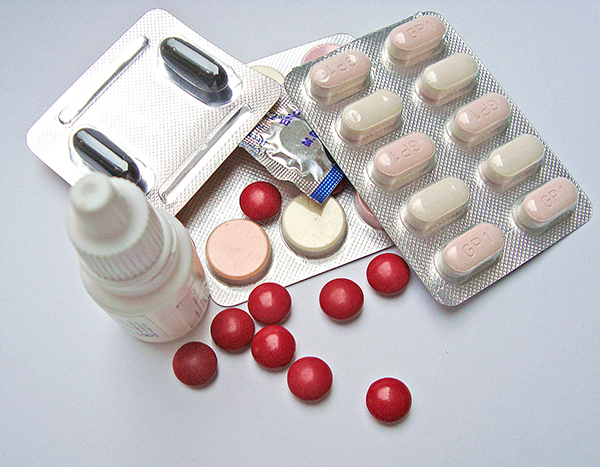Medicines can help you feel better and get well when you are sick. But if you don’t follow the directions, medicines can hurt you.
You can lower your chances of side effects from medicines by carefully following the directions on the medicine label or from your pharmacist, doctor, or nurse.
Side effects may be mild, like an upset stomach. Other side effects – like damage to your liver – can be more serious.
Take these simple steps to avoid problems with medicines.
- Follow the directions on the medicine label carefully.
- If you don’t understand the directions, ask your doctor, nurse, or pharmacist to explain them to you.
- Keep a list of all the medicines, vitamins, minerals, and herbs you use. Share this information with your doctor.
- Store your medicines in a cool, dry place where children and pets can’t see or reach them.
There are different types of medicine
The two categories of medicine are prescription and over-the-counter (OTC).
Prescription medicines
Prescription medicines are medicines you can get only with a prescription (order) from your doctor. You get these medicines from a pharmacy.
- Prescription medicines shouldn’t be used by anyone except the person whose name is on the prescription.
- Get rid of expired (out-of-date) or unused prescription medicines. Ask your pharmacist how to get rid of medicines safely.
- Sometimes you can choose between a generic medicine and a brand name medicine. Generic and brand name medicines work the same way, but generic medicine usually costs less.
- Talk to your doctor, pharmacist, or insurance company for more information about generic medicines. Learn more about generic medicines.
 Over-the-counter medicines
Over-the-counter medicines
Over-the-counter (OTC) medicines are medicines you can buy at a store without a prescription.
- Some examples of OTC medicines include:
- Cold and flu medicines
- Pain medicines like aspirin, acetaminophen, and ibuprofen
- Allergy medicines
- Sleep aids
- Toothpaste with fluoride
Drug Facts label
- All OTC medicines come with a Drug Facts label. The information on this label can help you choose the right OTC medicine for your symptoms.
- The Drug Facts label also gives you instructions for using the medicine safely. OTC medicines can cause side effects or harm if you use too much or don’t use them correctly.
- Following the directions on the Drug Facts label will lower your chances of side effects. Learn more about what’s on the Drug Facts label.
- Your doctor, nurse, or pharmacist can also help you choose OTC medicines and can answer any questions you may have.
Prevent problems and mistakes with your medicines.
- Follow the directions carefully.
- Be sure to read the directions carefully when taking prescription or OTC medicines. Review this guide to using OTC medicines safely [PDF – 944 KB].
- If you notice unpleasant side effects after taking medicine, like feeling dizzy or having an upset stomach, call your doctor or nurse.
Talk to your doctor.
Before you use any new prescription medicines, tell your doctor:
- About other medicines you use – both prescription and OTC medicines
- About any vitamins, minerals, or herbs you use
- If you are allergic to any medicines
- If you’ve had side effects after using any medicines
- If you are pregnant or breastfeeding, because some medicines may harm your baby
- If you have any questions or concerns about the new medicine
- Be sure to keep taking prescription medicines until your doctor tells you it’s okay to stop – even if you are feeling better.
- It’s also a good idea to talk to your doctor before you stop taking a prescription medicine – even if you’re worried it’s making you feel worse. Get more tips for talking to your doctor about medicine.Take Action: Ask Questions
Ask questions to make sure you understand.
To use a medicine safely, you need to know:
- The name of the medicine
- Why you are using the medicine
- How to use the medicine the right way
- If there are any medicines you shouldn’t take with this one
Ask your doctor or nurse questions to be sure you understand how to use your medicines. Take notes to help you remember the answers. You can even ask to record the instructions on your phone.
You can also ask a pharmacist if you forget how to use a medicine or you don’t understand the directions. Use these tips to talk with a pharmacist about your medicines.
Keep track of your medicines.
- Make a list of the medicines you use [PDF – 340 KB]. Write down how much you use and when you use each medicine.
- Take the list with you whenever you go to a medical appointment. You may also want to make a copy to give to a family member or friend in case you have a medical emergency.
- Read and save any information that comes with your medicine.
- Keep your medicine in the box or bottle it came in so you have all of the information from the label.
- Pay attention to the color and shape of your pills. If they look different when you get a refill, ask your pharmacist to double-check that you have the right medicine.
Put your medicines in a safe place.
Medicines that are stored correctly last longer and work better.
- Check for storage instructions on the medicine label – for example, some medicines need to be stored in the refrigerator.
- Store medicines that don’t have special storage instructions in a cool, dry place. Medicines can break down quickly in places that are damp and warm, like the kitchen or bathroom.
- Keep medicines away from children and pets. A locked box, cabinet, or closet is best. Get more tips for how to keep medicines away from children .
- Get rid of expired (out-of-date) medicines and medicines you no longer use. Follow these instructions to get rid of old or extra medicines safely.
Call the Poison Control Center (1-800-222-1222) right away if a child or someone else accidentally uses your medicine.
This article is from the U.S. Department of Health and Human Services. Read more on Senior Health issues at healthfinder.org
Do you suffer from WIMS (Web-Induced Medical Stress)?

